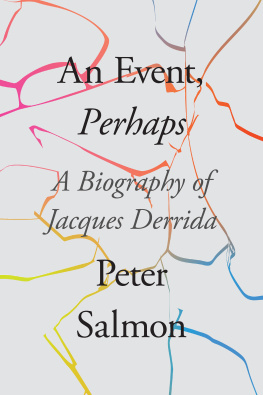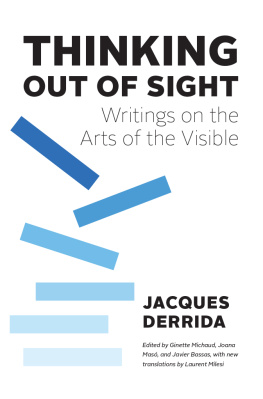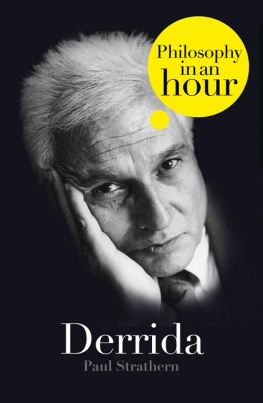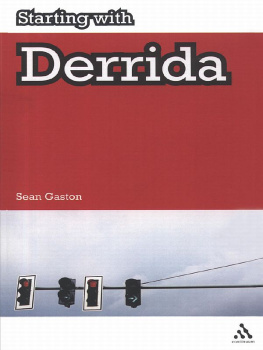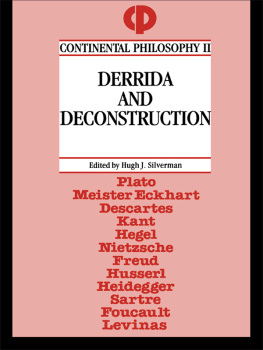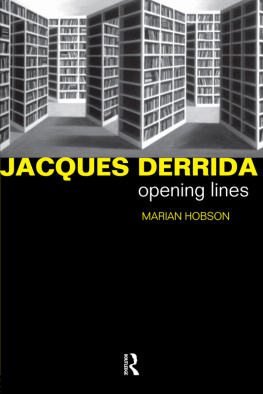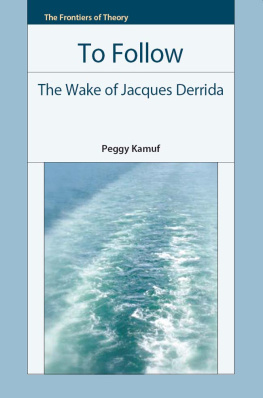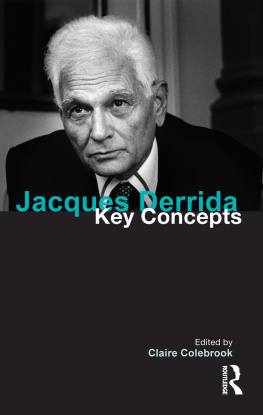Peter Salmon - An Event, Perhaps: A Biography of Jacques Derrida
Here you can read online Peter Salmon - An Event, Perhaps: A Biography of Jacques Derrida full text of the book (entire story) in english for free. Download pdf and epub, get meaning, cover and reviews about this ebook. year: 2020, publisher: Verso Books, genre: Detective and thriller. Description of the work, (preface) as well as reviews are available. Best literature library LitArk.com created for fans of good reading and offers a wide selection of genres:
Romance novel
Science fiction
Adventure
Detective
Science
History
Home and family
Prose
Art
Politics
Computer
Non-fiction
Religion
Business
Children
Humor
Choose a favorite category and find really read worthwhile books. Enjoy immersion in the world of imagination, feel the emotions of the characters or learn something new for yourself, make an fascinating discovery.
- Book:An Event, Perhaps: A Biography of Jacques Derrida
- Author:
- Publisher:Verso Books
- Genre:
- Year:2020
- Rating:5 / 5
- Favourites:Add to favourites
- Your mark:
- 100
- 1
- 2
- 3
- 4
- 5
An Event, Perhaps: A Biography of Jacques Derrida: summary, description and annotation
We offer to read an annotation, description, summary or preface (depends on what the author of the book "An Event, Perhaps: A Biography of Jacques Derrida" wrote himself). If you haven't found the necessary information about the book — write in the comments, we will try to find it.
An Event, Perhaps: A Biography of Jacques Derrida — read online for free the complete book (whole text) full work
Below is the text of the book, divided by pages. System saving the place of the last page read, allows you to conveniently read the book "An Event, Perhaps: A Biography of Jacques Derrida" online for free, without having to search again every time where you left off. Put a bookmark, and you can go to the page where you finished reading at any time.
Font size:
Interval:
Bookmark:

An Event, Perhaps
An Event, Perhaps
A Biography of
Jacques Derrida
Peter Salmon

First published by Verso 2020
Peter Salmon 2020
All rights reserved
The moral rights of the author have been asserted
1 3 5 7 9 10 8 6 4 2
Verso
UK: 6 Meard Street, London W1F 0EG
US: 20 Jay Street, Suite 1010, Brooklyn, NY 11201
versobooks.com
Verso is the imprint of New Left Books
ISBN-13: 978-1-78873-280-2
ISBN-13: 978-1-78873-283-3 (US EBK)
ISBN-13: 978-1-78873-282-6 (UK EBK)
British Library Cataloguing in Publication Data
A catalogue record for this book is available from the British Library
Library of Congress Cataloging-in-Publication Data
Names: Salmon, Peter, 1955 author.
Title: An event, perhaps : a biography of Jacques Derrida / Peter Salmon.
Description: London ; New York : Verso, 2020. | Includes bibliographical references and index. | Summary: An introduction to the life and work of the philosopher Jacques Derrida Provided by publisher.
Identifiers: LCCN 2020021106 (print) | LCCN 2020021107 (ebook) | ISBN 9781788732802 | ISBN 9781788732833 (US ebk)
Subjects: LCSH: Derrida, Jacques.
Classification: LCC B2430.D484 S275 2020 (print) | LCC B2430.D484 (ebook) | DDC 194 [B]dc23
LC record available at https://lccn.loc.gov/2020021106
LC ebook record available at https://lccn.loc.gov/2020021107
Typeset in Sabon by MJ & N Gavan, Truro, Cornwall
Printed in the UK by CPI Group (UK) Ltd, Croydon CR0 4YY
To Fiona
I have sometimes been troubled by a doubt whether what is true in one case may not be true in all. Then, when I have reached that point, I am driven to retreat, for fear of tumbling into a bottomless pit of nonsense.
Socrates (Plato, Parmenides)
Id never say this in public I still love beautiful books and believe in them.
Jacques Derrida
Contents
Perhaps something has occurred in the history of the concept of structure that could be called an event, if this loaded word did not entail a meaning which it is precisely the function of structural or structuralist thought to reduce or to suspect. But let me use the term event anyway, employing it with caution and as if in quotation marks.
O n 21 October 1966, a little-known thirty-six-year-old French philosophy teacher took to the stage at a conference on structuralism at Johns Hopkins University in Baltimore, to deliver a paper titled Structure, Sign and Play in the Discourse of the Human Sciences.
The symposium, portentously titled The Languages of Criticism and the Sciences of Man, had been running for three days, and was a huge intellectual event, bringing together over a hundred philosophers, literary critics, ethnographers, anthropologists, psychoanalysts and other cultural theorists from eight countries. Speakers included Roland Barthes, Jean Hyppolite, Hans-Georg Gadamer, Northrop Frye, Tzvetan Todorov and Jacques Lacan, while the attendees included future intellectual stars such as Paul de Man and Joseph Hillis Miller. Of the pre-eminent names in structuralism, only Michel Foucault was absent.
The symposium was organised to introduce structuralism to America. Structuralism was rapidly replacing the existentialism of Sartre, Camus and de Beauvoir as the dominant philosophical trend in France. Taking its lead from the linguistics of Ferdinand de Saussure and the anthropology of Claude Lvi-Strauss, and underpinned by Freud and Marx, structuralism rejected human-centred philosophy. Instead, it proposed that all elements of human culture, and all phenomena of human life, could only be understood as being part of a structure, and any explanation of motives, actions and behaviour had to overcome the illusion of a free subject. Everything could only be explained by its interrelationship to other parts of the scheme.
These insights were applied across a range of disciplines. In literature, structuralism moved away from the model of authorial intention the work as a creation of a single mind which knew what it was doing during the creative process and which produced a work whose effect corresponded, more or less, with what the author was trying to do to a model which saw the meaning of a work as being produced by its place within a system of shared narrative techniques, shared tropes, shared conventions and assumed worldviews. Meaning is produced by the works place in a genre (or outside of one), by the circumstances of its production and by the social (and intellectual and cultural) position of the reader.
Derrida had only been invited to the conference at the last moment, after the Belgian anthropologist Luc de Heusch was unable to attend. He came on the recommendation of the director of the cole normale suprieure, Jean Hyppolite, who provided what was hardly a ringing endorsement. I think, said Hyppolite, he would be somebody who would come.
Derrida was the final speaker on the final day. He remained a silent observer for much of the symposium. He looked on as Lacan rose to his feet with obscure questions at the end of each lecture, and as Barthes gently asked for clarification on various moot points. Eventually, however, Derrida, unused to speaking to large audiences, took to the stage, quietly shuffled his notes, and began, Perhaps something has occurred in the history of the concept of structure that could be called an event He spoke for less than half an hour. But by the time he was finished the entire structuralist project was in doubt, if not dead. An event had occurred: the birth of deconstruction.
Any biography of Derrida must, as a sort of contractual obligation to his thinking, foreground its caveats. Some are the caveats that any biography must include: an attempt to present a version of an individuals life and thought, whether ones own or that of someone elses, must by definition be partial, selective. Such an undertaking forms a narrative that could be told otherwise and that, presented in the form of a book with a beginning, middle and end, uses the structures of literature to present an object a life which is not ipso facto propitious to literary form, nor has any essential reason to mirror its tropes. The writer and the reader make a compact with each other sign a contract of sorts to ignore this deceit as much as possible, as the readers of fiction suspend their disbelief in order to care about the characters.
That Derrida explicitly problematised what we call biography makes the need for these caveats even more pressing. His analyses of proper names, the signature, hospitality, autobiography and, ultimately, the act of writing itself means that any declarative sentence is under suspicion, let alone any declarations about another human being. Access to the real is always already a representation, and all language is rhetorical rather than denotative.
The problem intensifies in an intellectual biography that, as part of its raison dtre seeks to identify and explicate the key concepts or the fundamental ideas of a particular thinker. Derridas key concept or fundamental idea is to and here one immediately searches verbs that are not emphatic reject (reject), disorder (disorder), complicate (complicate) or, to put it another way, to deconstruct (deconstruct) what we mean by key concepts and fundamental ideas. As Derrida himself wrote, once quotation marks demand to appear, they dont know when to stop.
Font size:
Interval:
Bookmark:
Similar books «An Event, Perhaps: A Biography of Jacques Derrida»
Look at similar books to An Event, Perhaps: A Biography of Jacques Derrida. We have selected literature similar in name and meaning in the hope of providing readers with more options to find new, interesting, not yet read works.
Discussion, reviews of the book An Event, Perhaps: A Biography of Jacques Derrida and just readers' own opinions. Leave your comments, write what you think about the work, its meaning or the main characters. Specify what exactly you liked and what you didn't like, and why you think so.

